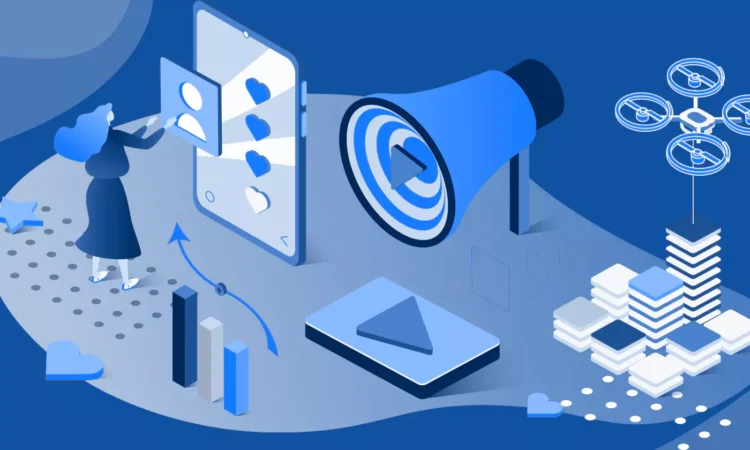
Nowadays, businesses must leverage online marketing strategies to build their brand, attract customers, and increase revenue. With more consumers relying on the internet to discover, evaluate, and purchase products or services, a strong digital presence is important.
However, simply having an online presence is not enough—businesses must implement the right strategies to stand out in a competitive market. Below, we explore some of the most effective online marketing strategies that drive success.
1. Search Engine Optimization (SEO)
An effective internet marketing strategy is built on Search Engine Optimization (SEO). It involves enhancing the technical, structural, and content elements of a website in order to increase its ranking in search engine results pages (SERPs). Credibility, organic traffic, and visibility all rise with higher ranks.
Key SEO Strategies:
- Conducting keyword research to target relevant search terms.
- Creating high-quality, informative content that provides value to users.
- Optimizing on-page elements such as meta titles, descriptions, and headers.
- Building authoritative backlinks to improve domain authority.
- Ensuring website speed, mobile-friendliness, and a seamless user experience.
Investing in professional SEO Services can help businesses refine their strategy and achieve long-term growth.
2. Content Marketing
To get in, hold on to, and engage an audience, content marketing is essential. Businesses may become leaders in their field and gain the trust of their clients by producing insightful and timely content.
Effective Content Marketing Tactics:
- Blogging regularly to share insights, tips, and industry updates.
- Producing video content to increase engagement and reach.
- Using infographics and visual content to simplify complex topics.
- Offering downloadable resources such as e-books and whitepapers.
- Creating interactive content like quizzes, surveys, and polls.
3. Social Media Marketing
Social media platforms give companies a chance to engage with their audience, show off their brand personality, and establish a connection. Customer loyalty and brand awareness can both be enhanced by a thoroughly planned social media strategy.
Best Practices for Social Media Marketing:
- Choosing the right platforms based on target demographics.
- Posting consistently with a mix of promotional, educational, and entertaining content.
- Engaging with followers through comments, messages, and community discussions.
- Running paid social media campaigns to reach a broader audience.
- Leveraging influencer marketing for greater credibility and reach.
4. Affiliate and Influencer Marketing
Affiliate and influencer marketing are powerful strategies for expanding brand reach and driving conversions. These methods involve partnering with individuals who have a strong online presence to promote products or services.
Benefits of Affiliate and Influencer Marketing:
- Access to a wider audience that trusts the influencer’s recommendations.
- Performance-based models where businesses only pay for successful conversions.
- Authentic endorsements that boost credibility and brand reputation.
To effectively leverage these strategies, businesses can seek professional Affiliate and Influencer Marketing Services to connect with the right partners and maximize ROI.
5. Pay-Per-Click (PPC) Advertising
PPC advertising allows firms to place customised advertisements on search engines and social media platforms, ensuring quick awareness. By bidding on keywords and deciding on a budget, companies may drive visitors to their website effectively.
Advantages of PPC Marketing:
- Immediate results compared to organic marketing efforts.
- Precise targeting based on demographics, location, and search intent.
- Measurable performance metrics to optimize campaigns.
- Retargeting capabilities to re-engage potential customers.
6. Email Marketing
Email marketing is still very successful even though it’s one of the more traditional forms of internet marketing. By using individualized communication, it enables companies to maintain client relationships, promote offers, and nurture leads.
Key Email Marketing Strategies:
- Building segmented email lists based on user behavior and preferences.
- Crafting compelling subject lines and valuable email content.
- Automating email sequences for welcome messages, follow-ups, and promotions.
- Analyzing open rates, click-through rates, and conversions for optimization.
7. Conversion Rate Optimization (CRO)
Increasing website traffic is just the first step; the main goal is to turn visitors into actual customers. In order to improve user experience and boost conversion rates, CRO focuses on making improvements to website aspects.
Ways to Optimize Conversions:
- A/B testing different landing page designs, CTAs, and headlines.
- Streamlining the checkout process for a seamless experience.
- Using trust signals such as testimonials, reviews, and security badges.
- Implementing chatbots and live chat to assist potential customers in real time.
8. Data Analytics and Performance Tracking
Regular monitoring and updating are necessary for effective web marketing. Businesses may improve their strategy and make data-driven decisions by monitoring important performance indicators.
Important Metrics to Track:
- Website traffic and user behavior.
- Conversion rates and customer acquisition costs.
- Social media engagement and ad performance.
- Email marketing open rates and click-through rates.
Conclusion
An effective online marketing strategy involves a combination of SEO, content marketing, social media, PPC, and more. Businesses that leverage these strategies can enhance their digital presence, attract more customers, and achieve long-term growth.
For expert guidance in building a comprehensive online marketing plan, explore our professional Digital Marketing Services, SEO Services, and Affiliate and Influencer Marketing Services to maximize your brand’s success in the competitive online landscape.



